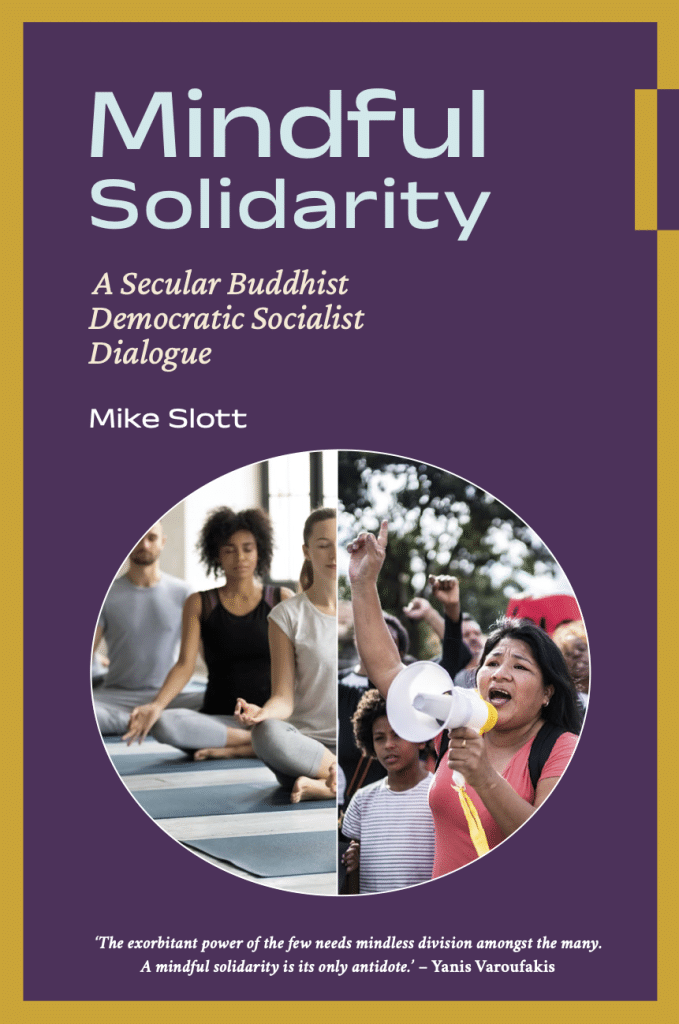Secular Buddhist Network: Five core tasks for mindful political activists
Provided via Tuwhiri, Mike Slott provides a secular buddhist perspective on socialist organising. Reprinted for 'The Commonweal Special Edition: What is to be done?' in March 2025.
In his book Mindful Solidarity (Wellington: Tuwhiri, 2024), Mike Slott offers a perspective which integrates the essential insights of the historical Buddha, Gotama, with radical political theory and activism. For those who are committed to this perspective, he proposes five core—or essential—tasks for creating a life that is meaningful and good, not just for oneself but for all.
Rather than provide answers to the question of the types of strategies socialists need in the short, medium, and long-term, these tasks provide socialists with a philosophical and ethical framework for our activism. They highlight our limits and vulnerabilities as human beings, as well as our capacities for mindfulness and compassion, which are crucial for building transformative movements.
#1 Recognize, accept and embrace our finite life in all its complexity
Our initial task is to face our multilayered experience just as it is, including its tragic dimension. We all experience the 10,000 joys and 10,000 sorrows of a human life.
While we have some ability to shape the course of our life to reduce suffering and experience more joy and happiness, much of what we experience is beyond our control. A life without any suffering at all would not be a truly meaningful human life.
#2 Understand the three basic causes of suffering
The inevitable pains and losses connected with our finite life and our relative lack of control over the processes of sickness, ageing, death, loss, not getting what we want, and getting what we don’t want.
Our biologically-evolved tendency to cling to or relate to what we experience in a reactive way, based on wanting something (greed), or wanting to avoid something (aversion, hatred), as well as our fundamental tendency to view ourselves and the world from the deluded perspective of the isolated, egoistical self.
The social systems of exploitation and oppression (capitalism, racism, sexism, homophobia, ageism, disrespect of persons with disabilities, and so on) mutually interact with and reinforce our tendencies to crave and to cling and have a delusory understanding of the self. In addition, these structures of exploitation and oppression directly harm.
#3 Use our capacities for wisdom, mindfulness and compassion to reduce suffering and promote human flourishing
Awareness of the three sources of suffering equips us to discern the situations in which we can make positive changes in our lives while staying within the limits of our agency.In this third task we use our mindfulness, compassion and wisdom to inform our actions, and the words directed at reducing suffering and promoting flourishing for all. In short, it is to act and speak ethically.
#4 Engage in a lifelong path of transformation based on skilful virtues, wisdom, meditative practices, an ethical life and political activism
This core life task comes close to the Buddhist eightfold path in promoting the need to cultivate a range of capacities that underpin a meaningful and ethical life.These capacities encompass cognition, affective states and bodily sensations; intentions and actions; and personal and communal practices.
But while this life task includes certain elements of the eightfold path, the range of capacities is expanded to include an understanding of critical social theories and what it means to be politically active.
#5 Make transformative changes at both individual and societal levels
We need to integrate transformative changes at both individual and social levels that reduce suffering and promote flourishing.The Four Noble Truths of traditional Buddhism do not make the connection between the individual and society because the cause of and remedy for suffering is primarily located within the individual.Recognizing that individual and social transformation are linked is essential. To the extent that we can transform ourselves through meditative practices, for example, we become more effective in our political practice.At the same time, our political activism should aim at both social transformation and individual transformation.
First published in Mindful Solidarity newsletter, 10 Dec 2024
Mike Slott is a lifelong US political and labor movement activist. A Buddhist practitioner since 2010, he is the editor of the Secular Buddhist Network website, responsible for their newsletter, Rethinking the Dharma/Reimagining Community.




Mike Slott’s book 'Mindful Solidarity: a secular Buddhist democratic socialist dialogue' has its own Substack newsletter
https://mindfulsolidarity.substack.com
and the book is available anywhere good books are sold; you can also get it directly from the publisher
https://tuwhiri.org/products/mindful-solidarity